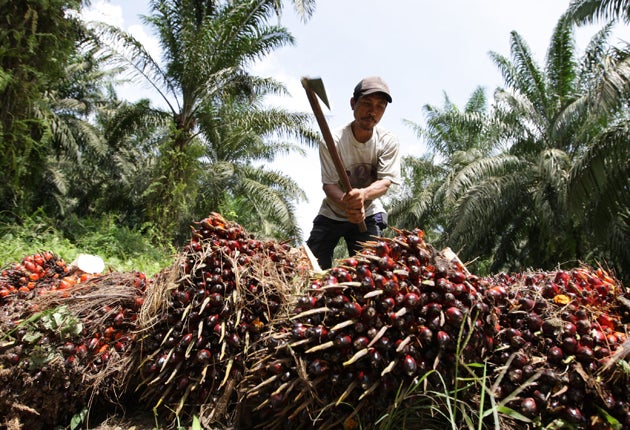M&S makes palm oil pledge to save forests
Commitment aimed at halting ecological damage done in South-east Asia

Your support helps us to tell the story
From reproductive rights to climate change to Big Tech, The Independent is on the ground when the story is developing. Whether it's investigating the financials of Elon Musk's pro-Trump PAC or producing our latest documentary, 'The A Word', which shines a light on the American women fighting for reproductive rights, we know how important it is to parse out the facts from the messaging.
At such a critical moment in US history, we need reporters on the ground. Your donation allows us to keep sending journalists to speak to both sides of the story.
The Independent is trusted by Americans across the entire political spectrum. And unlike many other quality news outlets, we choose not to lock Americans out of our reporting and analysis with paywalls. We believe quality journalism should be available to everyone, paid for by those who can afford it.
Your support makes all the difference.Marks & Spencer will commit to paying more for sustainable palm oil across its entire range of products today in an attempt to limit environmental damage in south-east Asia.
In a rolling programme over the next six years, M&S will buy GreenPalm certificates for sustainably produced palm oil equivalent to the amount it uses in almost 1,000 food, beauty and home products. Like other food manufacturers, M&S pours palm oil, the world's cheapest vegetable fat, into a wide variety of food and household products such as biscuits and convenience foods.
By early next year, the retailer said nine products, including 200g packs of oatcakes, a 500g cookie selection and seven types of cooked potatoes, would be covered by the GreenPalm scheme. By 2015, it promised to buy certificates for all relevant products. M&S, which would not disclose the cost of the commitment, is also funding a 120-acre wildlife corridor between plantations in Borneo.
Paul Willgoss, head of food technology, said M&S had been using alternatives to palm oil over the past two years wherever possible, for example using rapeseed oil in fish fingers. "Where palm oil can't be replaced as an ingredient, we will only use certified sustainable palm oil," he said.
"By early 2010 we will have the UK's widest selection of certified sustainable palm oil products, with a range of nine items including cookies, oatcakes and potatoes."
Widely regarded as an environmental disaster, palm oil production has precipitated the destruction of vast swathes of rainforest on the Indonesian and Malaysian islands of Sumatra and Borneo, which has led to the eviction of indigenous tribes and moved orangutans closer to extinction.
Under an initiative launched by Unilever in 2004, the Roundtable on Sustainable Palm Oil (RSPO) certifies producers that abide by a series of environmental rules including a ban on new plantations in virgin forest. However, only one per cent of RSPO oil had been sold by this summer because separating a "clean" supply from more damaging production costs an extra 10 to 20 per cent. Under the ancillary GreenPalm scheme, firms continue using normal supplies while buying certificates for otherwise undervalued RSPO production to reward environmental stewardship.
A Hull-based firm, AAK, auctions the certificates for around £6 a tonne, adding about two per cent to the cost.
M&S, which is likely to use tens of thousands of tonnes annually, said sustainable production was central to its commitment to reduce CO2 emissions linked to deforestation, and hoped its actions would "send a clear signal of demand to the market".
In May, The Independent disclosed the confirmed, or suspected, presence of palm oil in 43 of the UK's 100 best-selling brands, including Flora, Hovis, Kingsmill, KitKat, Dove, Comfort and Persil.
Next week, the wildlife group WWF, which helped found the RSPO, will publish ratings of the palm oil policies of UK food companies in an attempt to raise pressure on them to source supplies sustainably. Sandra Charity, its UK head of forest programmes, described Marks & Spencer's move as "significant". Adam Harrison, senior policy adviser, added: "It is vitally important that all retailers and manufacturers show by their actions that they want to eliminate the negative impacts of our demand for palm oil."
Join our commenting forum
Join thought-provoking conversations, follow other Independent readers and see their replies
Comments